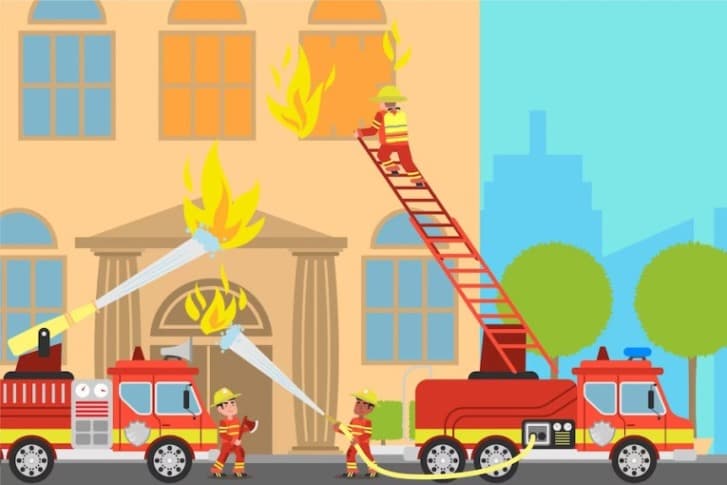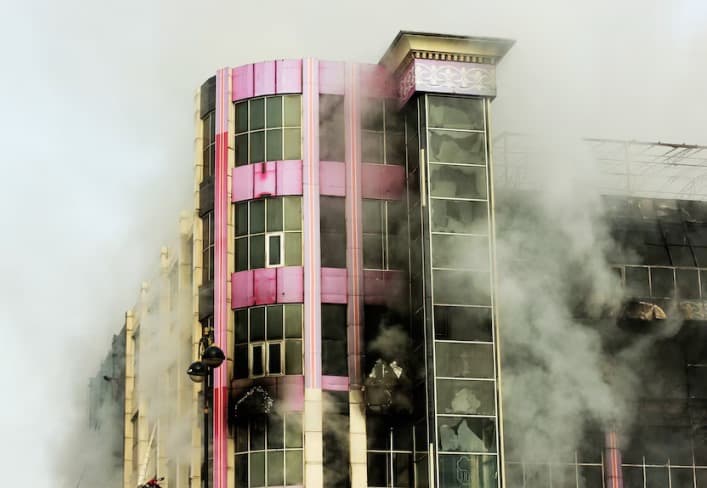In the event of an apartment fire, determining liability can be a complex and challenging process. Depending on the circumstances surrounding the fire, various parties may be held responsible for the damages and losses suffered by the tenants and the property owner. In this article, we will explore the legal aspects of determining liability for an apartment fire.
Landlord Liability
Landlords may be held liable for an apartment fire if they have been negligent in their duty to provide a safe living environment for their tenants. Some examples of landlord liability in an apartment fire include:
- Failure to provide working smoke detectors: Landlords are responsible for providing and maintaining working smoke detectors in each apartment unit. If a fire occurs and it is determined that the smoke detectors were not functioning, the landlord may be held liable.
- Failure to maintain electrical wiring: Landlords are responsible for maintaining safe electrical wiring in the apartment building. If faulty wiring leads to a fire, the landlord may be held liable for failing to address the issue.
- Failure to maintain appliances: Landlords are responsible for maintaining safe appliances in the apartment building. If a fire is caused by a faulty appliance that the landlord failed to repair or replace, the landlord may be held liable.
- Failure to address known fire hazards: Landlords are responsible for addressing known fire hazards, such as storing flammable materials in common areas or failing to properly maintain heating systems. If a fire occurs as a result of a known hazard that the landlord failed to address, the landlord may be held liable.
Tenant Liability
Tenants may be held liable for an apartment fire if the fire was caused by their negligence or intentional actions. Some examples of tenant liability in an apartment fire include:
- Smoking indoors: If a tenant smokes indoors and causes a fire, they may be held liable for any resulting damages.
- Leaving candles or other open flames unattended: If a tenant leaves candles or other open flames unattended and causes a fire, they may be held liable.
- Overloading electrical outlets: If a tenant overloads electrical outlets and causes a fire, they may be held liable.
- Using faulty or dangerous appliances: If a tenant uses faulty or dangerous appliances, such as a space heater with frayed wiring, and causes a fire, they may be held liable.
Third-Party Liability
Third-party liability in an apartment fire refers to the liability of individuals or entities who are not tenants or landlords, but who may have played a role in causing the fire. Some examples of third-party liability in an apartment fire include:
- Contractors: If a fire is caused by faulty electrical work or other negligent actions by a contractor hired by the landlord or tenant, the contractor may be held liable.
- Manufacturers: If a fire is caused by a defective product, such as a faulty appliance or electrical wiring, the manufacturer may be held liable.
- Visitors or guests: If a fire is caused by the negligence of a visitor or guest of a tenant, the visitor or guest may be held liable.
- Utility companies: If a fire is caused by a gas leak or other utility-related issue, the utility company may be held liable.
Can I Sue My Apartment Complex for a Fire?
If you have suffered damages or injuries as a result of an apartment fire, you may be wondering whether you have the right to sue your apartment complex. While the answer to this question will depend on the specific circumstances of the fire, there are situations in which you may be able to file a lawsuit against the apartment complex. Check some exploration below when you can sue your apartment complex for a fire.
1. Negligence
One of the most common reasons for suing an apartment complex for a fire is negligence. If the apartment complex or its employees failed to take reasonable precautions to prevent the fire, such as failing to maintain fire safety equipment or ignoring known fire hazards, they may be held liable for any damages or injuries resulting from the fire.
To prove negligence, you will need to show that the apartment complex had a duty of care to prevent the fire and that they breached that duty, causing the fire and resulting damages or injuries.
2. Breach of Warranty of Habitability
All landlords have a legal obligation to provide their tenants with a safe and habitable living environment. If the apartment complex failed to meet this obligation, such as by failing to maintain smoke detectors or sprinkler systems, they may be held liable for any damages or injuries resulting from the fire.
To prove a breach of the warranty of habitability, you will need to show that the apartment complex failed to maintain a safe living environment and that this failure directly caused the fire and resulting damages or injuries.
3. Product Liability
In some cases, a fire may be caused by a defective product, such as a faulty electrical appliance or wiring. If the apartment complex provided or installed the defective product, they may be held liable for injuries and damages.
To prove product liability, you will need to show that the product was defective and that the apartment complex was responsible for providing or installing it.
4. Intentional Misconduct
In rare cases, a fire may be caused by intentional misconduct, such as arson. If the apartment complex or its employees were involved in the intentional misconduct, they may be responsible for this.
Common Injuries Resulting from Apartment Fires
Apartment fires can be incredibly dangerous and result in a variety of injuries, ranging from minor burns to severe smoke inhalation. We will explore some of the common injuries that can result from apartment fires.
1. Burns
One of the most common injuries resulting from apartment fires is burns. Burns can occur from direct contact with flames or hot surfaces, as well as exposure to hot gases or liquids.
Depending on the severity of the burn, it may require medical attention, including skin grafts or other surgical procedures.
2. Smoke Inhalation
Smoke inhalation is another common injury resulting from apartment fires. When a fire burns, it produces toxic gases that can cause damage to the lungs and other organs.
Smoke inhalation can cause coughing, shortness of breath, chest pain, and even respiratory failure in severe cases.
3. Trauma Injuries
During an apartment fire, tenants may attempt to escape by jumping from windows or balconies. This can result in severe trauma injuries such as broken bones, head injuries, and spinal cord injuries.
Even if tenants do not jump, they may be injured by falling debris or collapsing structures.
4. Carbon Monoxide Poisoning
Carbon monoxide is a colorless, odorless gas that can be produced by apartment fires. When inhaled, it can cause headaches, dizziness, nausea, and even death in severe cases.
Carbon monoxide poisoning can be difficult to detect, so it is important to have working carbon monoxide detectors in the apartment.
5. Emotional Trauma
Even if tenants are not physically injured in an apartment fire, they may still suffer emotional trauma. The experience of being trapped in a burning building or losing personal belongings can be incredibly traumatic and may lead to anxiety, depression, and other mental health issues.
FAQ:
Q: Can a landlord be held liable for an apartment fire caused by a tenant’s negligence?
It depends on the specific circumstances of the fire. If the landlord can prove that they took all necessary precautions to prevent the fire and it was caused solely by the tenant’s negligence, the tenant may be held liable. However, if the landlord failed to provide adequate safety equipment or failed to address known fire hazards, they may share liability for the damages and losses.
Q: What should tenants do to prevent apartment fires?
Tenants should follow all fire safety regulations outlined in their lease agreement, including not smoking indoors, not leaving cooking appliances unattended, and properly storing flammable materials. They should also ensure that all smoke detectors are working and report any potential fire hazards to their landlord immediately.
Q: What should landlords do to prevent apartment fires?
Landlords should ensure that their property is up to code, all necessary safety equipment is in place, and any potential fire hazards are addressed. They should also educate tenants on fire safety regulations and ensure that all smoke detectors are working properly. Finally, they should respond promptly to any reports of potential fire hazards and take action to address them.

